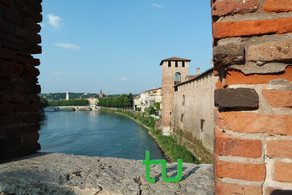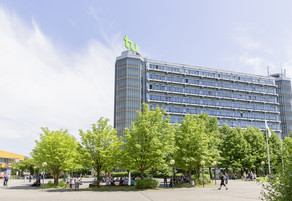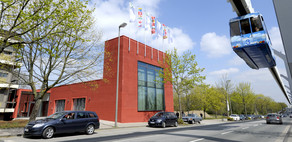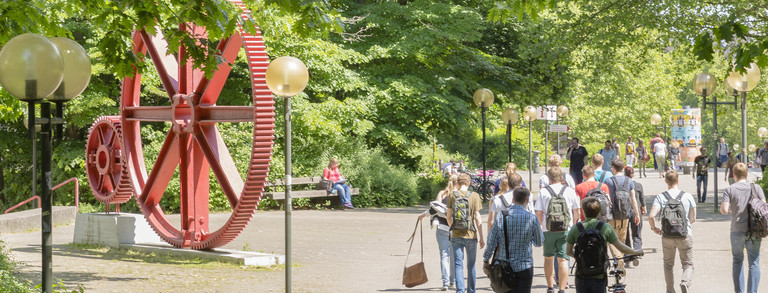“It Was Always a Dream of Mine to Study in Germany”
Yu Kawahara from Brazil came to TU Dortmund University in 2012 as an exchange student and spent two semesters at the Department of Mechanical Engineering. His stay was funded by the Brazilian government’s “Science Without Borders” scholarship program. After a subsequent internship, he completed his studies in São Carlos and is now working as a junior professor at the “Instituto Tecnológico de Aeronáutica (ITA)” in São José dos Campos. In this interview, he talks about how his eighteen months in the Ruhr Valley influenced his life and his career path.
This interview was conducted in German and translated into English here. You can find the original version on our German alumni pages.
We’re conducting the interview in German. Had you already learned German before your stay in Dortmund?
I went to a German school in Brazil and had German lessons from an early age. I was then able to deepen and further develop my language skills during my year abroad at TU Dortmund University. But there’s a difference, of course, between what you learn at school and how you speak in everyday life: Speed and rhythm are different, and then there is slang. “Ruhrpottdeutsch”, the German spoken in the Ruhr Valley, is something special, but there are a lot of nice and funny expressions – for example, that “ein Haufen Kohle”, a heap of coal, means something like “a load of money”.
How did it come about that you took the plunge and went to the Ruhr Valley during your studies?
It was always a dream of mine to study in Germany, and fortunately I had the opportunity to do so during my studies. I had already got to know Dortmund as a fantastic city beforehand and was very pleased that my application to TU Dortmund University was successful, as the Department of Mechanical Engineering is very strong in research. I studied at TU Dortmund University for two semesters in 2012 and then completed a six-month internship at Faiveley Transport Witten – both were a tremendous experience. Then I went back to Brazil and earned my master’s degree there, with the aim, however, of returning to Germany. But when I was given the opportunity to work as a lecturer at the ITA, I took it and have now been teaching technical drawing there for three years.
Was there anything that surprised you when you started your studies at TU Dortmund University?
In Brazil, lectures with more than 60 students are the exception, at least in engineering. That was quite different at TU Dortmund University where, for example, I attended lectures with 200 or 250 students. What was also surprising was the fact that there is only one exam per course each semester – on the one hand, it’s nice if there are fewer exams, but nothing must go wrong!
There are, in any case, cultural differences between Brazil and Germany. Germans are friendly too, but a little more reserved, so that it’s not always quite so easy to find friends. I try first to see everything in a positive light, for example bureaucracy – it exists in Germany too, but it works!
Do you have any very special memories of your time in Dortmund?
I got to know a lot of people and like to look back at everything we did – not just studying but also free time and parties. But a very special event was the Champions League game between BVB and Real Madrid. It was my first time in a German stadium. We spent the night with our German teacher and other Brazilians in the line in front of the shop to buy the tickets – pretty cold in October! I gave one of my two tickets to a German friend, and he was so happy. He could sing all the songs and taught me them. It was a very special evening, not least because BVB won 2:1.
Did you have a favorite place on TU Dortmund University’s campus?
The student pubs, without a doubt. Spunk, for example. Lots of exchange students always met there – not only those from Brazil but also from throughout the whole of Europe, and German students too, of course.
What recommendations would you give to new students – exchange students or young people in general – who are starting their studies at TU Dortmund University?
Above all, enjoy your time there. My special advice for exchange students is to try to speak German without being afraid to make mistakes. You don’t have to speak perfect German. Germans know that their language is difficult and aren’t bothered if you make mistakes. The more you speak, the better you will get.
In general, the balance between study and free time is important as well as being open to meeting new people and experiencing new things. Simply try something new!
Thank you very much for the interview!
You Might also be Interested in:
Back to "Alumni International"
Find more information about TU Dortmund University's Alumni Network
More testimonials from international students:












![[Translate to English:] [Translate to English:]](/storages/international/_processed_/1/e/csm_alumni_kawahara_b3345585bb.jpg)